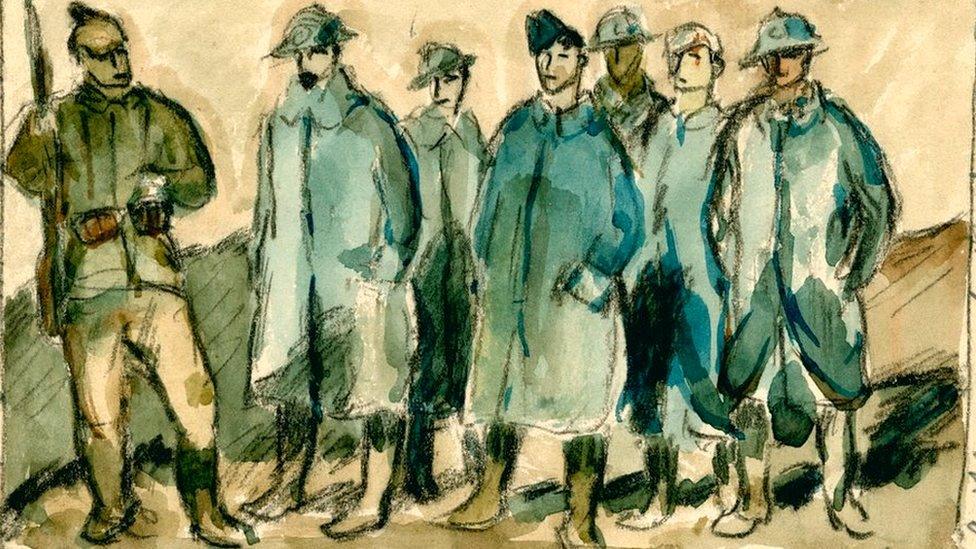The letters that ended World War One
- Published
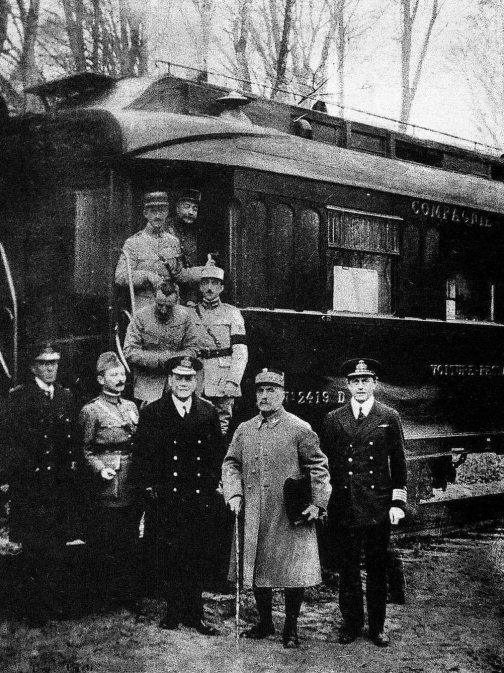
Rear Admiral Hope (front right) was part of the British delegation at the Armistice talks
After four years of bloody conflict, the Armistice was finally signed in November 1918. The arrival of American troops, earlier that year, saw the Germans grow progressively weaker and their officers privately conceded they had no hope of victory.
A series of letters, the most reliable form of communication in an age when electronic methods were in their infancy, marked the path towards peace.
The formal negotiations began on 8 November 1918 in a luxurious railway carriage in a siding in a forest near Paris.
The German delegation, led by civilian Matthias Erzberger, had no choice but to accept tough terms demanded by Britain, France and America.
At the end of a momentous day, Rear Admiral Sir George Hope, a member of the British delegation, wrote to his wife Arabella.
"Erzberger was very nervous at first and spoke with some difficulty, the general awfully sad, the diplomat very much on the alert, and the naval officer sullen and morose."
'Subordinate rank'
Rear Admiral Hope judged the accommodation "most comfortable".
"The British have a wagon-lit to ourselves with all possible conveniences: there are several other wagon-lits and a dining saloon," he wrote.
The German delegation was in a similar train, about 100 yards away.
They had hoped to make it "principally a civilian affair", notes Rear Admiral Hope.
"The French and we are very angry with them for only sending military and naval officers of a rather subordinate rank."
The German party approached in single file and got into the conference carriage where "we received them stiffly but courteously".
The two sides exchanged salutes and lined up on different sides of the table, recalled Rear Admiral Hope.
"The terms were then read out to them and evidently made them squirm, but they were probably prepared for most of them as they must know the present military position and the state of mutiny in the fleet."
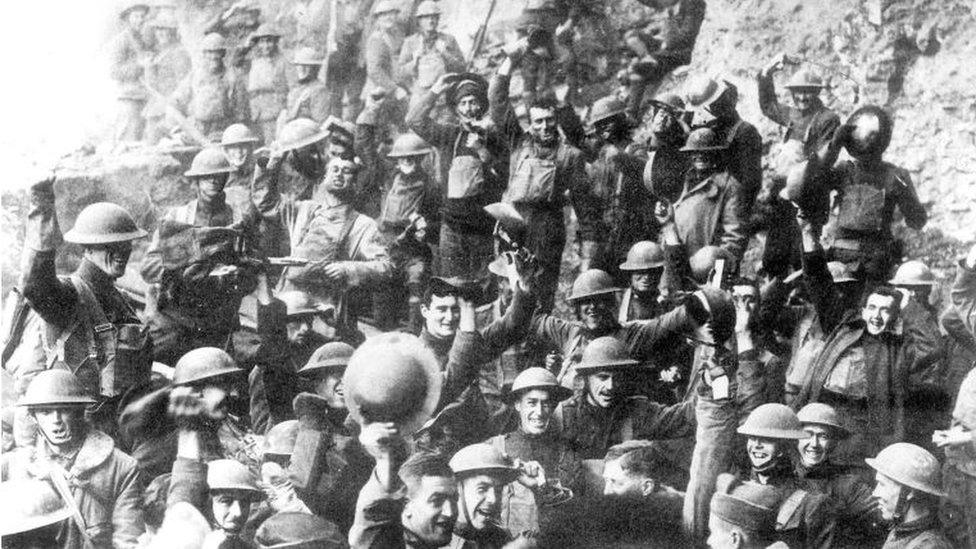
News of the Armistice was celebrated by Allied troops, among them the US 64th regiment
Rear Admiral Hope's private letter was first published in 1979 by Leeds University historian Peter Liddle, in his book Testimony of War.
"He was perfectly placed, superbly placed. Nobody better to record it," Dr Liddle told the BBC.
"It's not just one man's experience, in minuscule, of events, it is a man near the very heart of important things that were happening."

The Armistice 100 years on

Long read: The forgotten female soldier on the forgotten frontline
Video: War footage brought alive in colour
Interactive:, external What would you have done between 1914 and 1918?
Living history: Why 'indecent' Armistice Day parties ended

It is one of five letters, written by key players at key points in the weeks before the Armistice, selected by Cambridge historian Sir Richard J Evans and the Royal Mail, to highlight the crucial role of written communication and postal services in the Great War.
"Every combatant nation had a postal service," says Prof Evans.
"In Britain these were post office personnel who were given military ranks and a bit of training, but basically organised a worldwide postal service across the empire.
"And you had something similar with the Germans and the Austrians and so on, because it was very important to get letters to the troops and letters back, to maintain morale, and of course at a very high level to communicate."
The US had joined the war in 1917 and the following year, the arrival of American troops bolstered France and Britain, leaving the German army unable to withstand a series of sustained attacks.
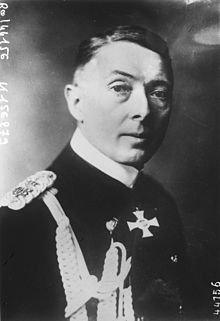
Paul von Hintze said it was time to "give up the game" in Bulgaria
Germany became increasingly isolated, as its allies dropped out of the war, among them, Bulgaria, where the government collapsed.
In a telegram on 1 October, Germany's State Secretary for Foreign Affairs, Paul von Hintze, wrote to representatives at Army Grand Headquarters: "According to the most recent reports from Bulgaria, we must give up the game there.
"From a political point of view, there is no point in our keeping our troops there, let alone reinforcing them."

Within days, the Germans requested a truce.
Prince Max von Baden, Imperial Chancellor in a newly formed, rather more democratic German government, wrote to US President Woodrow Wilson, offering to accept his terms.
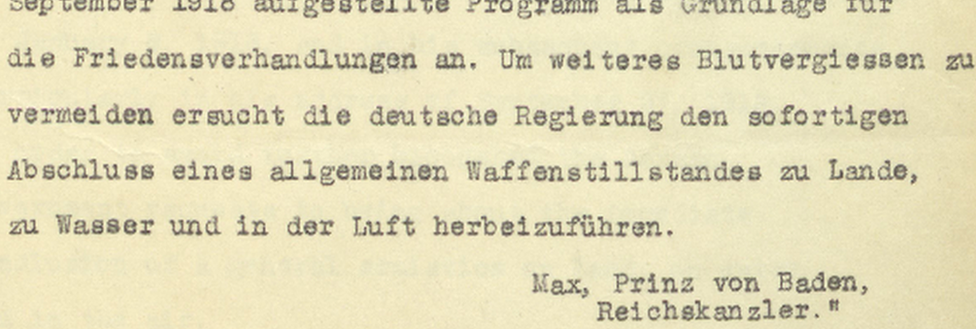
"In order to avoid further bloodshed the German government requests to bring about the immediate conclusion of a general armistice on land, on water, and in the air," he wrote.
According to Prof Evans, the German generals "thought they might be able to hold off the allies on the Western Front for a bit longer, but they were under no illusion about the fact that they were not going to win by this stage and so they thought it was best to sue for peace".
He adds that the new democratic government hoped it might get fairly decent terms from the Americans, who were now calling the shots.
But on 27 October, Germany was further weakened, when Austro-Hungary left the war.
In a letter to Germany's Kaiser Wilhelm II, Austro-Hungarian Emperor Karl wrote: "It is my duty, heavily though it lies upon me, to inform you that my people are neither able, nor willing, to continue the war.
"I do not have the right to oppose this wish, since I no longer hope for a favourable outcome.
"The moral and technical preconditions for it are lacking, and useless blood letting would be a crime that my conscience forbids me to commit."
This allowed the British and French to push President Wilson for harsher terms, says Prof Evans.
"They thought he was a bit wishy-washy, vague and idealistic. So they toughened up the terms of the Armistice."
The Germans simply had to accept the terms offered and the Americans said they would only negotiate with a democratic government, forcing the abdication of the Kaiser on 9 November.
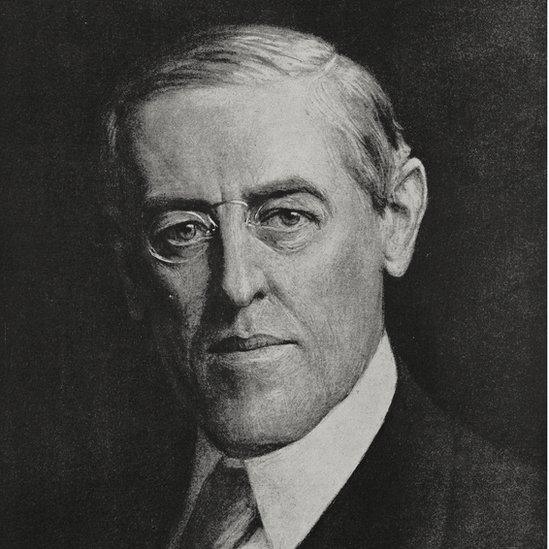
US President Woodrow Wilson called the shots
The fifth letter shows how news of the Armistice was slow to spread to the more distant parts of the war.
In east Africa, the British wanted to send a telegram to the German Colonel Paul von Lettow-Vorbeck, who had fought a successful guerrilla war against the British for four years.
'Under white flag'
But the British could not find him and he only got to hear about the Armistice when his troops captured a motorcycle despatch rider, carrying the telegram to be delivered "under white flag".
"The problem was... he couldn't believe the Kaiser had abdicated, and got in touch with the British High Commissioner asking for confirmation," says Prof Evans.
"Eventually he was given credible evidence that this was not a ruse designed to trick him into abandoning the struggle and signed a formal cessation of hostilities on 25 November 1918.
"So that's the last gasp of the war really... and it's the GPO (General Post Office) that plays a role in bringing it about."
- Published9 November 2018
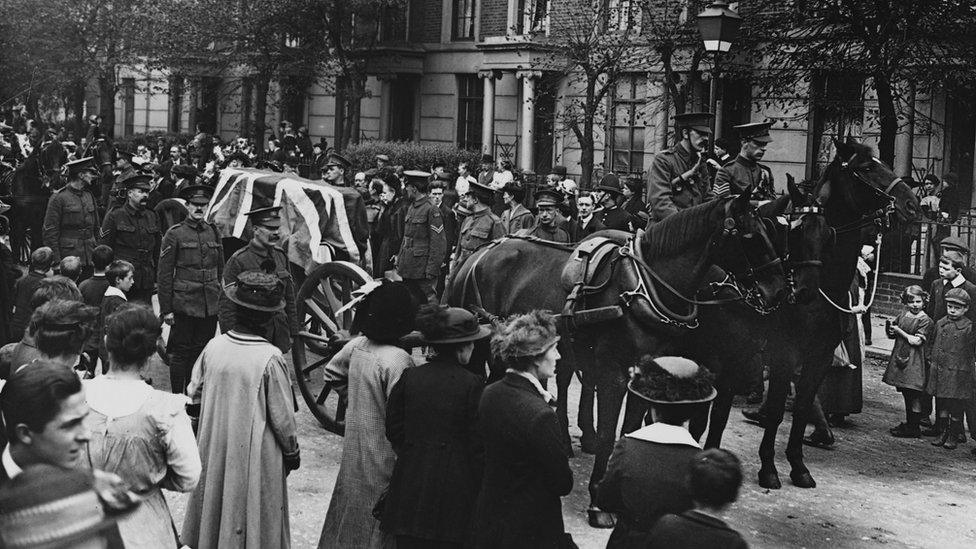
- Published8 November 2018
